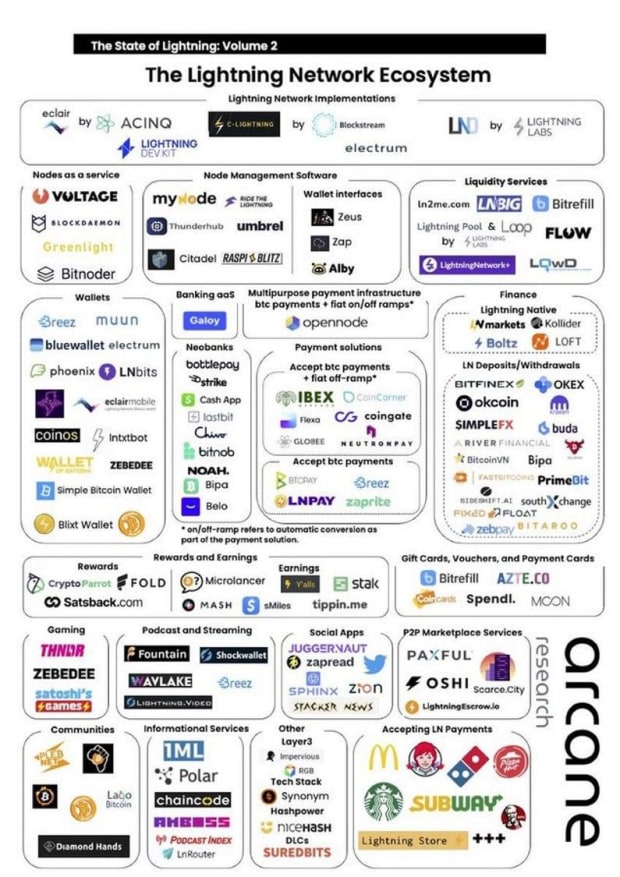[ad_1]
This is an opinion editorial by Tim Niemeyer, co-host of the Lincolnland Bitcoin Meetup and a member of the Chief Lightning Officers.
On January 4, 2023 (block 770,402, for those of you keeping score at home), the Chief Lightning Officers (CLO) was created.
What started out as a small group of voluntary plebs has blossomed into roughly 50 Bitcoiners engaging in bi-weekly calls with the intent to arm each other with all of the necessary tools and skills to further Lightning adoption at the local level. The plebs that make up the group have wide-ranging skill sets across multiple industries, such as education, finance and information technology, in addition to holding blue-collar jobs. This grassroots movement has lofty goals. As early member Mark Maraia stated in an interview for this article, CLOs have embarked on a mission of helping “Lightning rails rule the Earth.”
Diagnosing Before Prescribing
While Maraia and many others in the group have sales experience, the goal is not about “closing the deal”: Self-appointed members of CLO, who call themselves “chief Lightning officers,” meet local, prospective Lightning point-of-sale (PoS) merchants with a fact-finding mindset: they build relationships with these local merchants and uncover their pain points. While it’s easy for Bitcoiners to say “Bitcoin fixes this,” CLOs attempt to, as Maraia puts it, “diagnose before you prescribe.”
The biggest frictions discussed by the group have been high fees, delayed settlements, the security of in-house funds, friction during international business transactions and overreaching government regulations. But, as anyone who has studied the Lightning Network enough has realized, it has boundless potential to reduce fees, “lightning” quick final settlement, increased security and privacy, not to mention its ability to be borderless and permissionless.
The goal of the first few meetings of CLO was to determine which industries were ripe for Lightning adoption. Of the early suggestions were cannabis dispensaries, coffee shops (oh, the irony — paying for coffee with bitcoin), food trucks and non-chain restaurants, local sports teams and craft brewers, to name a few. During each meeting, the group brainstorms other industries that would benefit from utilizing the Lightning payments network (LPN). The group agrees that local Bitcoin meetups should all be working toward having merchants at their meetup spot accept Lightning payments. Some already are, like Boulder Bitcoin, which created an LNURL/QR code that funds meetup event items such as drinks and pizza. Lincolnland Bitcoin is in the process of obtaining the World’s Smallest Bitcoin (Lightning) Hobby ATM so that local plebs can convert their spare change into bitcoin.
Member Successes
One CLO member, Holly Young, recently shared her experience hosting a Lightning workshop in Portugal for merchants and local small business owners. Aside from being called a “spammer” and accused of “promoting a Ponzi scheme or profiteering,” Young had a productive experience. Thanks to the help of a tech-savvy family member, attendees of her workship were able to successfully create Coinos accounts. In an article for Bitcoin Magazine, Young described her motivation, “For me personally, the possibility of hooking the vendors up with the Bitcoin community and the Bitcoin community with people producing goods of genuine value is a key driver in organizing events of this kind.”
Since that workshop, Young has received several requests for similar one-on-one support. She is increasingly assured of Lightning’s potential “as more and more of us devote time and energy to helping it along its natural path to success,” she told me.
Another CLO member, Ryan Brisch, has had recent success onboarding a local restaurant to accept bitcoin via the Lightning payments network. Brisch, who recently started a business called “Lightning Network Solutions” which helps merchants set up the ability to accept Lightning payments, explained the process in his own words for this article.
“Thanks to my local Bitcoin group, I learned about a new restaurant called Bitcoin Grill, but that they weren’t yet set up to accept bitcoin payments on chain or via Lightning,” he said. “After having my discussions with a couple business owners, including a restaurateur, I decided to call the restaurant and asked to speak to one of the owners. From there I scheduled a meeting. The first attempt was a dud, the owner had something come up and left me hanging.”
As any Bitcoiner knows, this is a common problem; most people require multiple touchpoints before being able to grok Bitcoin/Lightning.
Brisch continued, “After learning their Bitcoin journey, I showed him the IBEX solution. He was blown away by how easy it was to use and asked if he could sign up for it on the spot! So, we walked through the sign-up process and created a couple of BPTs (Bitcoin payment terminals) on a couple of their iPads.”
From there, Brisch took the time to follow up by training the servers. As previously stated, the goal is not to close the deal but rather to build a relationship with local merchants. Brisch foresees more follow-up training to ensure a smooth transition.
Another tool in the CLO members’ toolbelts is inviting and interviewing businesses built on Lightning. The CLO members realize that every merchant has needs specific to their situations. Therefore, they don’t prescribe one solution; rather, they stay platform agnostic. The group has so far sought out the expertise of the following: Analys Falchuk of IBEXPay, Michael Atwood of Oshi and Adam Soltys of Coinos. In addition, a large part of meetings discuss the pros and cons of various Lightning infrastructures. And it’s not like there are just a few to sift through (see image below). Of the many options, Wallet of Satoshi, Phoenix, Muun, LightSats and Blixt, as well as payment processors like BTCPay Server and plenty of others, have been analyzed.

Maraia believes Lightning adoption will gain traction in 2023. His reasoning is as follow:
“(There are a) dizzying number of companies that are innovating like crazy. Lightning companies are like Legos. People will use the Lightning payments network without knowing it. The Lightning payments network is the Trojan horse (for bitcoin adoption). (We’re) building a community of problem solvers in payments. Lightning can go places and do things fiat can’t.”
If you run a Lightning business or you’re a pleb wanting to help further Lightning adoption in your area, consider reaching out to the CLO Telegram group. Find a Bitcoin meetup in your area. Locate merchants accepting bitcoin and Lightning in your area. Adoption won’t happen on its own. It takes individuals like you and me willing to go the extra mile.
Like nodes on a network, we are the ones disseminating the boundless benefits of these revolutionary technologies in a peer-to-peer payment system that is soon to cover the globe. Remember… Lightning rails rule the Earth.
This is a guest post by Tim Niemeyer. Opinions expressed are entirely their own and do not necessarily reflect those of BTC Inc or Bitcoin Magazine.
[ad_2]
Source link
My NEO Group:
– White paper My NEO Group: https://myneo.org
– Discover NEO X: https://docs.myneo.org/products/in-development/neo-x
– Disccover NEO Dash: https://myneodash.com
– Discover Banca NEO: https://bancaneo.org
– Interview of the CEO of My NEO Group, Mickael Mosse, in Forbes: https://forbesbaltics.com/en/money/article/mickael-mosse-affirms-commitment-to-redefining-online-banking-with-bancaneo






